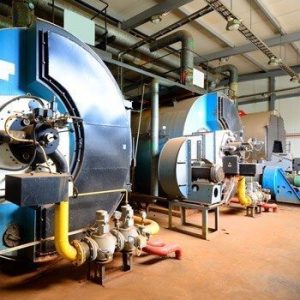 The objective of a boiler water programme is to control/minimise deposit formation, corrosion and carryover, in order to achieve this, a treatment programme will comprise:
The objective of a boiler water programme is to control/minimise deposit formation, corrosion and carryover, in order to achieve this, a treatment programme will comprise:
- An oxygen scavenger
- Polymers to provide deposit control
- Phosphate except for steam generators or where feedwater quality is very high and the Feedwater alkalinity is a high proportion of TDS and pressure is <10 bar
- Alkalinity builder if there is insufficient natural alkalinity.
- Amine treatments as allowed by process requirements.
The objective of a testing programme is to ensure that the treatment programme is maintaining boiler water chemistry within agreed limits.
Boiler Water Tests and Control – BS 2486
Boilers present a considerable potential danger if not operated correctly. For this reason, in the UK, boilers are required to be officially inspected annually to ensure that they are not dangerous. In the UK also there is a standard BS2486 – which provides recommendations for water conditions that will ensure a boiler is operated safely and efficiently. There is such a wide variety of boilers that the recommendations are to be used as guidelines and each boiler system considered on its merits. Nevertheless BS2486 provides an excellent base for most boiler water treatments.
Analytical Testing
Analytical tests should be carried out on make-up water, feedwater, condensate and boiler water. The objective of these tests is to ensure that the system is operating correctly or if adjustments to treatment are required.
These tests can be carried out by a Feedwater Consultant measuring chemical reserves and control limits we have adopted.
It is considered essential that control tests are not just carried out by a Feedwater Consultant but that the plant operators should maintain a log of boiler test results correlated with details of plant operation.
BS2486 suggests that ‘the test and their frequency should be determined for each plant if necessary in consultation with a specialist’.
There is a suggestion that ‘boiler water, feedwater and condensate be tested once per day and the ion exchange plant 3 times a day’.
Testing procedures should be agreed with plant personnel. As a guide it may be considered that for small plants tests may only be needed once or twice a week to ensure safe, efficient operation. As plant size and complexity increases the frequency and sophistication of testing increases.
The suggested minimum tests to be carried out by operators would be:
On boiler water:
- TDS (neutralised sample)
- pH/alkalinity
- Oxygen scavenger (SO3 or tannin)
- Phosphate
On Feedwater:
- pH,
- TDS
- hardness.
On softened make-up water:
- hardness
Articles in our Knowledge base are available for:
– The development of boiler water treatment and properties of steam.
– The different types of boilers.
– The components that make up a steam system are discussed in detail.
– The three key problems of boiler operation:
- Deposits and Corrosion
- Carryover, are discussed in detail and treatments identified




